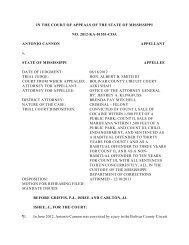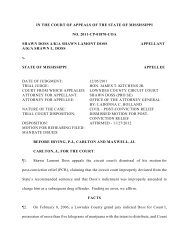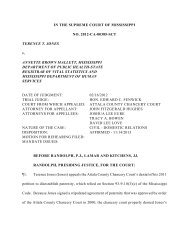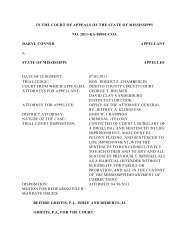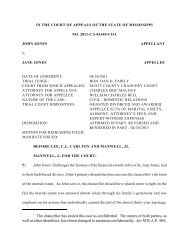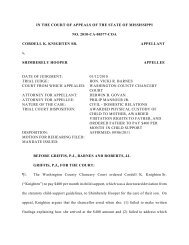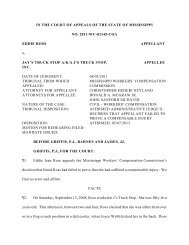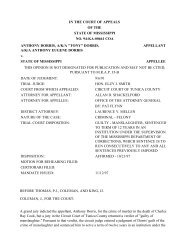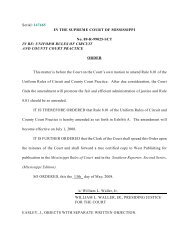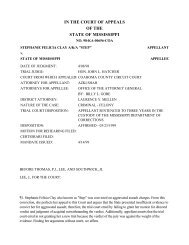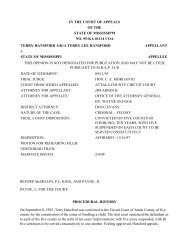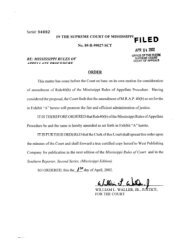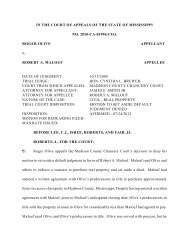IN THE COURT OF APPEALS OF THE STATE OF ... - Justia
IN THE COURT OF APPEALS OF THE STATE OF ... - Justia
IN THE COURT OF APPEALS OF THE STATE OF ... - Justia
You also want an ePaper? Increase the reach of your titles
YUMPU automatically turns print PDFs into web optimized ePapers that Google loves.
<strong>IN</strong> <strong>THE</strong> <strong>COURT</strong> <strong>OF</strong> <strong>APPEALS</strong> <strong>OF</strong> <strong>THE</strong> <strong>STATE</strong> <strong>OF</strong> MISSISSIPPI<br />
NO. 2009-KA-01891-COA<br />
KEITH BOYDA APPELLANT<br />
v.<br />
<strong>STATE</strong> <strong>OF</strong> MISSISSIPPI APPELLEE<br />
DATE <strong>OF</strong> JUDGMENT: 9/10/2009<br />
TRIAL JUDGE: HON. LAWRENCE PAUL BOURGEOIS JR.<br />
<strong>COURT</strong> FROM WHICH APPEALED: STONE COUNTY CIRCUIT <strong>COURT</strong><br />
ATTORNEYS FOR APPELLANT: W. DANIEL H<strong>IN</strong>CHCLIFF<br />
LESLIE S. LEE<br />
ATTORNEY FOR APPELLEE: <strong>OF</strong>FICE <strong>OF</strong> <strong>THE</strong> ATTORNEY GENERAL<br />
BY: LADONNA C. HOLLAND<br />
DISTRICT ATTORNEY: CONO A. CARANNA II<br />
NATURE <strong>OF</strong> <strong>THE</strong> CASE: CRIM<strong>IN</strong>AL - FELONY<br />
TRIAL <strong>COURT</strong> DISPOSITION: CONVICTED <strong>OF</strong> MURDER AND<br />
SENTENCED TO LIFE <strong>IN</strong> <strong>THE</strong> CUSTODY<br />
<strong>OF</strong> <strong>THE</strong> MISSISSIPPI DEPARTMENT <strong>OF</strong><br />
CORRECTIONS<br />
DISPOSITION: AFFIRMED- 3/1/2011<br />
MOTION FOR REHEAR<strong>IN</strong>G FILED:<br />
MANDATE ISSUED:<br />
BEFORE MYERS, P.J., ISHEE, ROBERTS AND MAXWELL, JJ.<br />
MAXWELL, J., FOR <strong>THE</strong> <strong>COURT</strong>:<br />
1. A jury in the Stone County Circuit Court found Keith Boyda guilty of murdering his<br />
wife. On appeal, Boyda raises a weight-of-the-evidence argument challenging the jury’s<br />
rejection of his insanity defense. We find sufficient evidence supporting the State’s position<br />
that Boyda understood right from wrong, including the testimony of two expert witnesses.
Finding no merit to Boyda’s remaining arguments that the circuit court committed error in<br />
several evidentiary rulings, we affirm.<br />
FACTS AND PROCEDURAL HISTORY<br />
2. On April 26, 2005, Boyda and his wife argued for much of the afternoon in their home<br />
in Wiggins, Mississippi. Boyda at some point placed his 9-millimeter pistol in the waistband<br />
of his pants and went out to the front porch. Once outside, he fired several rounds from the<br />
pistol. He then re-entered the house, pulled his wife from the couch, and fired four 9-<br />
millimeter rounds into her shoulder, chest and back. Their fifteen-year-old daughter, Theresa<br />
Boyda, witnessed the shooting.<br />
3. After the shooting, Boyda left the scene in his vehicle with Theresa and brought along<br />
a .22-caliber rifle. He made several stops. He first stopped at his neighbor’s house. But<br />
when the neighbor threatened to call the police, he drove Theresa to the nearby home of one<br />
1<br />
of her friends, J.C. While there, Theresa told J.C. that Boyda had just shot her mother.<br />
Meanwhile, J.C.’s mother, Melissa Scott, overheard Boyda admit to someone on the<br />
telephone, “She’s dead. She’s dead.” After hanging up, Boyda told Scott that he had killed<br />
his wife. As Boyda was leaving, he told Scott that she “could call the cops now.”<br />
4. Boyda and Theresa then departed for Boyda’s mother’s home in Gulfport, Mississippi.<br />
Before arriving, Boyda told Theresa that he “was sorry for everything” he had done. Boyda<br />
was eventually apprehended by the police at a gas station in D’Iberville, Mississippi.<br />
5. Four expert witnesses testified about Boyda’s legal sanity. The defense offered two<br />
1<br />
The record is not clear what J.C.’s last name is.<br />
2
expert witnesses, one in the field of clinical psychology and the other a forensic psychiatrist.<br />
Both testified that at the time of the offense, Boyda was M’Naghten insane. In rebuttal, the<br />
State offered testimony from two experts—one in forensic psychology and the other in<br />
forensic psychiatry. Both testified that Boyda was legally sane when he killed his wife.<br />
6. The jury convicted Boyda of murder, and the circuit court sentenced him to life<br />
imprisonment. On appeal, he argues: (1) the verdict is against the overwhelming weight of<br />
the evidence, and (2) the trial court’s evidentiary rulings prevented him from developing his<br />
theory of defense.<br />
I. Weight of the Evidence<br />
DISCUSSION<br />
7. Boyda argues the verdict cannot stand because the weight of the evidence supports<br />
that Boyda was M’Naghten insane. He points to the following. First, after Boyda shot his<br />
wife in the presence of his daughter Theresa, he asked Theresa, “What should we do about<br />
Mommy?” Second, Boyda’s counsel claims Boyda “went visiting” with his daughter<br />
following the shooting, which no legally sane person would have done. Third, Boyda points<br />
to testimony that he talked to the turtles in his yard and that he claimed he “invented the air<br />
conditioning in his house,” among other unusual statements, as evidence he was not sane<br />
when he shot his wife.<br />
8. When reviewing a claim based on the weight of the evidence, we evaluate the<br />
evidence in the light most favorable to the verdict and “will only disturb [the] verdict when<br />
it is so contrary to the overwhelming weight of the evidence that to allow it to stand would<br />
sanction an unconscionable injustice.” Bush v. State, 895 So. 2d 836, 844 (18) (Miss.<br />
3
2005). We must accept as true all evidence consistent with the defendant’s guilt, along with<br />
any reasonable inferences that might be drawn from the evidence. Young v. State, 891 So.<br />
2d 813, 821 (21) (Miss. 2005). An appellate court’s authority to grant a new trial based on<br />
the weight of the evidence should only “be invoked only in exceptional cases in which the<br />
evidence preponderates heavily against the verdict.” Bush, 895 So. 2d at 844 (18).<br />
A. M’Naghten<br />
9. Mississippi follows the classic M’Naghten test to determine a criminal defendant’s<br />
sanity.<br />
To establish a defense on the ground of insanity, it must be clearly proved that<br />
at the time of committing of the act the accused was laboring under such defect<br />
of reason from disease of the mind as (1) not to know the nature and quality<br />
of the act he was doing, or (2) if he did know it, that he did not know that what<br />
he was doing was wrong. More succinctly, the test for insanity is whether the<br />
defendant was unable to distinguish right from wrong at the time the act was<br />
committed.<br />
Roundtree v. State, 568 So. 2d 1173, 1181 (Miss. 1990) (internal citations and quotations<br />
omitted). Once the defendant raises a reasonable doubt as to his sanity, the State then must<br />
prove the defendant’s sanity beyond a reasonable doubt. Id. The jury determines the issue<br />
of insanity. Id. In making its decision, “the jury may accept or reject expert and lay<br />
testimony.” Id.<br />
B. Expert Testimony<br />
10. In Crawford v. State, 787 So. 2d 1236 (Miss. 2001), the Mississippi Supreme Court<br />
held that the jury verdict was not against weight of the evidence where one defense expert<br />
found the defendant M’Naghten insane, but the State’s two rebuttal experts found the<br />
defendant legally sane. Id. at 1243 (27-30). The supreme court reasoned when “there is<br />
4
testimony on both sides of the issue” of the defendant’s sanity, “a jury’s verdict [on that<br />
issue] is essentially conclusive and unreviewable.” Id. at (29). The court further explained:<br />
“[I]nstitutional and practical considerations mandate that in insanity defense cases, perhaps<br />
more than any other, a jury’s verdict ought to be given great respect and deference.” Id.<br />
11. We are confronted with a similar “battle of the experts.” The defense offered Dr. Erin<br />
Skaff, who testified as an expert in clinical psychology, and Dr. Rennie Culver, who testified<br />
as an expert in forensic psychiatry. Dr. Skaff examined Boyda in July 2006 and diagnosed<br />
him as a paranoid schizophrenic. She believed to a reasonable degree of psychological<br />
certainty that Boyda did not know right from wrong when he shot his wife. Dr. Culver<br />
examined Boyda on April 3, 2006, and reported Boyda had a “psychotic disorder not<br />
otherwise specified.” At trial, he agreed with Dr. Skaff that Boyda had paranoid<br />
schizophrenia and was M’Naghten insane.<br />
12. The State called two expert witnesses in rebuttal. Forensic psychologist Dr. Gilbert<br />
Macvaugh testified to a reasonable degree of psychological certainty that Boyda did not<br />
suffer from a major mental illness, such as schizophrenia, that impaired his ability to<br />
distinguish right from wrong. But Dr. Macvaugh explained that Boyda might suffer from<br />
paranoid personality disorder or narcissistic personality disorder. Dr. Macvaugh pointed out<br />
that Boyda has never been treated for paranoid schizophrenia for forty years of his life, and<br />
it is very unusual for someone Boyda’s age to suddenly develop symptoms. Dr. Reb<br />
McMichael testified as an expert in forensic psychiatry, and he largely agreed with Dr.<br />
Macvaugh’s opinions. He echoed that Boyda did not have schizophrenia, but rather a<br />
personality disorder. Dr. McMichael agreed with Dr. Macvaugh that Boyda knew the<br />
5
distinction between right and wrong when he killed his wife.<br />
13. Boyda contends the State’s experts had to ignore their own testing, which did not<br />
detect malingering of schizophrenia symptoms. Yet Boyda had full opportunity to challenge<br />
this alleged inconsistency on cross-examination. Dr. Macvaugh explained that just because<br />
Boyda did not score in a range to suggest malingering at the time of the exam did not mean<br />
that he was not malingering at other times. Dr. Macvaugh’s conclusions were based in part<br />
on an interview, which occurred subsequent to the testing. During the interview, Boyda<br />
claimed he had no memory of the shooting. However, he told at least two other individuals<br />
about it immediately after it occurred, which Dr. Macvaugh concluded suggested<br />
malingering. In addition, Dr. McMichael considered notes from a nurse who attended to<br />
Boyda at the jail. The nurse’s notes reflected Boyda’s symptoms became “more obvious and<br />
dramatic right before a court appearance” and subsided once the court appearance was over,<br />
which Dr. McMichael found inconsistent with schizophrenia.<br />
14. Boyda argues his inquiry to his daughter immediately following the shooting<br />
concerning what to do about “Mommy” shows convincingly that he was M’Naghten insane.<br />
But viewing the evidence in a light most favorable to the verdict, this statement could just<br />
as easily be interpreted as a solicitation of advice about the next course of action.<br />
15. Boyda also claims his behavior after the shooting, which he characterizes as<br />
“visiting,” convincingly supports his insanity theory. However, his actions also support an<br />
inference of flight. In cases where the defendant has plead insanity, various other<br />
jurisdictions have held that a jury may draw an inference of guilt from the accused’s flight<br />
immediately following the commission of the crime. See Flenory v. State, 588 So. 2d 940,<br />
6
942 (Ala. Crim. App. 1991) (“[T]he conduct of the appellant and his demeanor immediately<br />
following the criminal activity can provide an inference of sanity.”); Cunningham v. State,<br />
426 So. 2d 484, 490 (Ala. Crim. App. 1982) (In insanity cases, “[f]light from justice, and its<br />
analogous conduct, [are] deemed indicative of a consciousness of guilt.”); Wallin v. State,<br />
646 S.E.2d 484, 489 (Ga. Ct. App. 2007) (finding no prejudice in ineffective-assistance-of-<br />
counsel claim in part because “flight can serve as evidence of defendant’s consciousness of<br />
guilt” in insanity cases) (citation and internal quotations omitted); Welborn v.<br />
Commonwealth, 157 S.W.3d 608, 615 (Ky. 2005) (In insanity cases, “[f]light and attempt<br />
at concealment are circumstantial evidence of guilt because they suggest a guilty state of<br />
mind.”).<br />
16. Following the shooting, Boyda demanded that Theresa, the only eyewitness to the<br />
shooting, leave from the scene with him. He armed himself with a .22 rifle, then took<br />
Theresa to the nearest neighbor’s house. When the neighbor threatened to call the police,<br />
they left. Theresa then suggested that they go to her friend J.C.’s home, hoping that he could<br />
help get her out of her predicament. Upon arrival, Boyda admitted to Melissa Scott that he<br />
had shot his wife and, notably, told her that she “could call the cops now.” When Boyda<br />
decided to leave, Theresa asked to remain with J.C. and Scott, but Boyda refused her request.<br />
Boyda and Theresa then got back on the road.<br />
17. According to Theresa, Boyda eventually pulled over and stopped the vehicle on a road<br />
resembling a “pathway.” Boyda told her, “I’m sorry for everything I’ve done.” After<br />
speaking to Theresa for one or two hours, Boyda got back onto the highway to drive to his<br />
mother’s house in Gulfport. Police ultimately apprehended him when he stopped at a<br />
7
D’Iberville gas station.<br />
18. We are not persuaded that reasonable jurors must have concluded that Boyda’s<br />
behavior and statements directly following the shooting evidenced he was legally insane.<br />
Rather, the jury was certainly free to reasonably infer that by arming himself with a rifle,<br />
leaving the scene, and making several stops, Boyda was conscious of his guilt and was<br />
fleeing from the scene. We further note that Boyda apologized to his daughter for<br />
“everything,” and he refused to let her, the only eyewitness to the crime, leave, even after she<br />
requested to do so.<br />
19. Given the expert testimony and circumstantial evidence supporting Boyda’s legal<br />
sanity, we find that it was reasonable for the jury to find Boyda guilty of murder. We are<br />
unable to say that this is an exceptional case where the evidence preponderates heavily<br />
against the verdict. Nor do we find that allowing the verdict to stand would sanction an<br />
unconscionable injustice. Therefore, we conclude that the verdict is not against the<br />
overwhelming weight of the evidence.<br />
II. Evidentiary Rulings<br />
20. Boyda next claims the circuit court erred in limiting the testimony of his brother, Kyle<br />
Boyda. The excluded testimony pertains to Boyda’s behavior after the April 2005 shooting.<br />
Boyda’s trial counsel made an offer of proof, which suggests Kyle would have testified,<br />
among other things, that Boyda thought the FBI was trying to poison him and that local<br />
officials in Stone County were conspiring against him. Some of the testimony concerns<br />
behavior that occurred over four years after the shooting.<br />
21. At trial, defense counsel argued this testimony was relevant to the question of whether<br />
8
2<br />
Boyda had regained his sanity after committing the crime. On appeal, Boyda’s counsel<br />
raises a different argument. He now claims the excluded testimony is relevant to whether<br />
Boyda was insane when he committed the crime.<br />
22. This court has held that an argument not raised in the trial court will not be considered<br />
on appeal. Dimaio v. State, 951 So. 2d 581, 587 (14) (Miss. Ct. App. 2006) (citing Thorson<br />
v. State, 895 So. 2d 85, 104 (43) (Miss. 2004)) (declining to discuss the merits of the trial<br />
court’s refusal of a jury instruction because appellate counsel raised an entirely different<br />
argument than trial counsel); Aguilar v. State, 847 So. 2d 871, 880 (23) (Miss. Ct. App.<br />
2002) (citing Holland v. State, 587 So. 2d 848, 868 n.18 (Miss. 1991)) (argument that the<br />
trial court improperly excluded evidence was procedurally barred where the basis of the<br />
argument was different on appeal); see also Ponder v. State, 335 So. 2d 885, 886 (Miss.<br />
1976) (“A trial judge cannot be put in error on a matter which was not presented to him for<br />
decision.”); cf. Thompson v. State, 33 So. 3d 542, 547 (15) (Miss. Ct. App. 2010) (citing<br />
Swington v. State, 742 So. 2d 1106, 1110 (9) (Miss. 1999)) (“[A]n objection based on one<br />
specific ground waives all other possible grounds.”); Kiker v. State, 919 So. 2d 190, 199<br />
(34) (Miss. Ct. App. 2005) (quoting Brown v. State, 682 So. 2d 340, 350 (Miss. 1996))<br />
(“An objection at trial cannot be enlarged in a reviewing court to embrace an omission not<br />
complained of at trial.”). The ground on which Boyda wished to admit the disputed evidence<br />
was rendered moot by the jury’s guilty verdict. Because his new argument that the evidence<br />
2<br />
See Miss. Code Ann. § 99-13-7(1) (Supp. 2010) (“When any person is indicted for<br />
an offense and acquitted on the ground of insanity, the jury rendering the verdict shall state<br />
in the verdict that ground and whether the accused has since been restored to his sanity and<br />
whether he is dangerous to the community.”).<br />
9
is relevant to his sanity at the time of the offense was not before the trial court, it is<br />
procedurally barred.<br />
23. Still we note his claim lacks merit. Kyle, as a lay witness, was precluded from stating<br />
an opinion as to Boyda’s sanity at the time he killed his wife based upon Boyda’s post-<br />
shooting behavior. See Baggett v. State, 793 So. 2d 630, 635 (14) (Miss. 2001) (quoting<br />
Russell v. State, 729 So. 2d 781, 786 (Miss. 1997)). We point out that Dr. Skaff spoke with<br />
Boyda’s brothers and considered information gathered from them in forming her opinions.<br />
And Dr. Skaff’s testimony largely covered the same behavior included in the proffered<br />
testimony. Also, during Dr. Macvaugh’s cross-examination, Boyda’s attorney questioned<br />
him about much of this same behavior. Further, Kyle was permitted to testify fully regarding<br />
Boyda’s bizarre behavior prior to the shooting. If any error was committed in the exclusion<br />
of Kyle’s testimony, it was harmless. Jackson v. State, 594 So. 2d 20, 25 (Miss. 1992) (A<br />
trial court’s “admission or exclusion of evidence must result in prejudice and harm, if a cause<br />
is to be reversed on that account.”).<br />
24. Boyda next claims that he was prejudiced by the State asking “irrelevant” questions<br />
about Dr. Skaff not being licensed to practice in Mississippi. However, Boyda’s trial counsel<br />
did not object to this line of questioning at trial. Thus, he failed to preserve this issue for<br />
appeal. See Jordan v. State, 995 So. 2d 94, 111 (55) (Miss. 2008). Boyda also failed to<br />
raise this issue in his motion for a new trial, which serves as an additional procedural bar to<br />
our review. See Watts v. State, 492 So. 2d 1281, 1291 (Miss. 1986) (citing Pool v. State, 483<br />
So. 2d 331, 336 (Miss. 1986)).<br />
25. Boyda finally contends the circuit court erred by excluding Dr. Skaff’s resume.<br />
10
Because Boyda was given ample opportunity to, and did, bolster Dr. Skaff’s qualifications<br />
through questioning, we find no error in the exclusion of her resume. See Herrington v.<br />
Spell, 692 So. 2d 93, 103 (Miss. 1997), overruled on other grounds Whittington v. Mason,<br />
905 So. 2d 1261 (Miss. 2005).<br />
26. Finding no reversible error, we affirm Boyda’s conviction and sentence.<br />
27. <strong>THE</strong> JUDGMENT <strong>OF</strong> <strong>THE</strong> STONE COUNTY CIRCUIT <strong>COURT</strong> <strong>OF</strong><br />
CONVICTION <strong>OF</strong> MURDER AND SENTENCE <strong>OF</strong> LIFE <strong>IN</strong> <strong>THE</strong> CUSTODY <strong>OF</strong><br />
<strong>THE</strong> MISSISSIPPI DEPARTMENT <strong>OF</strong> CORRECTIONS IS AFFIRMED. ALL<br />
COSTS <strong>OF</strong> THIS APPEAL ARE ASSESSED TO STONE COUNTY.<br />
K<strong>IN</strong>G, C.J., LEE AND MYERS, P.JJ., IRV<strong>IN</strong>G, GRIFFIS, BARNES, ISHEE,<br />
ROBERTS AND CARLTON, JJ., CONCUR.<br />
11



